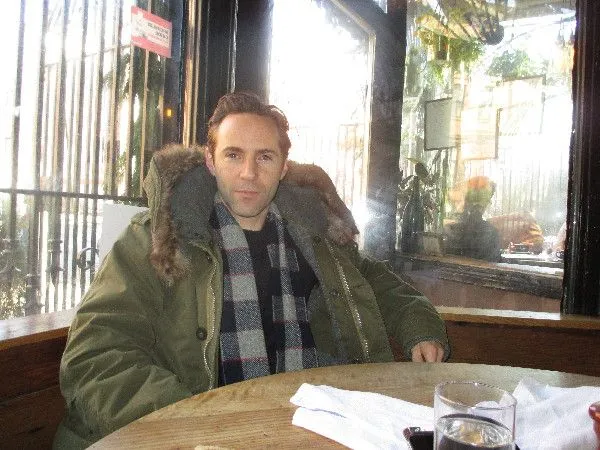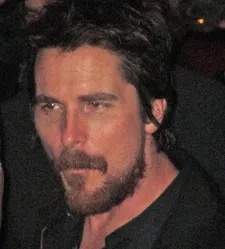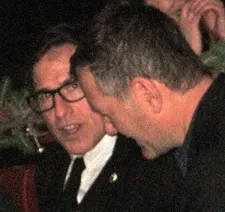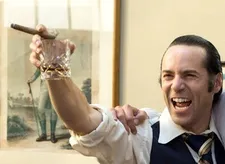 |
| American Hustle director David O. Russell used fauna as a guide for Alessandro Nivola on his role as Anthony Amado: "My guy was a bull." Photo: Anne-Katrin Titze |
When I met up with Alessandro Nivola the day before the US release of American Hustle on a frosty blustery morning at a Brooklyn cafe to discuss with him how his character took shape, he was seated with two pals, one of whom was Ethan Hawke.
The fantastic American Hustle cast, starring Christian Bale, Bradley Cooper, Amy Adams, Jeremy Renner, Jennifer Lawrence, along with Nivola, Louis C.K., Jack Huston, Michael Peña, Shea Whigham, Elisabeth Röhm, and an uncredited Robert De Niro had just received a Screen Actors' Guild nomination for Outstanding Performance by a Cast in a Motion Picture. American Hustle also received the New York Film Critics' Awards for Best Picture, Best Screenplay, and Best Supporting Actress (for Jennifer Lawrence).
We started out with Russell's directing style, how Nivola's character Anthony Amado came about, and why the Seventies were such a perfect fit, not only for clothes, hair and make-up.
Anne-Katrin Titze: You promised me at the Monkey Bar reception for American Hustle that you were going to tell me how David O. Russell directs unlike any other. What does he want from his actors?
Alessandro Nivola: I think what he wants more than anything is for scenes to be alive. I don't think that he is that prescriptive about how he wants scenes to play, as much as that he wants there to be the spark of life in it, you know. Not feel deadened by something too planned out.
AKT: How does he do that? How does he keep the spark?
AN: Well, I think I explained it a little bit when I saw you [at the Monkey Bar reception], the thing about movie making is that it's a very technical medium. It's not like a painting where you just take out a brush and can express yourself directly. It's not like writing where you just sit down with a piece of paper and a pencil. It's not even like acting on a stage where you get up there and there is a direct, immediate response from an audience. There's all of these mechanics that have to be mastered, completely apart from the performances. Those mechanics generally work in cross purposes to getting the best out of performers. He has worked out a way of filming that takes all those obstacles away. Just from a technical standpoint, what he does is that he lights from outside the room.
 |
| Christian Bale's Irving Rosenfeld was "described as a badger" by Russell. Photo: Anne-Katrin Titze |
AKT: That's very unusual.
The period glow - even the cheeks look rosier - doesn't hide the timeless truths: "It's scary how easy it is to take money from desperate people. " This is what the con-artists in American Hustle do until they are caught with a scheme of fake London banking connections by FBI agent Richie DiMaso, played by Bradley Cooper.
AN: All the lights in the room were practical lights, lights that you would actually find in a room. Then he had a big golden ball that the camera operator or some assistant would hold underneath the camera and would move around with it, wherever it went. So if he turned the camera on me this big golden light would turn on me as well. That was the only light that was in the room other than the ones that were on my desk or that would actually be there. As a result he wasn't forced to break a scene up into what you call coverage. He doesn't do that. He just comes in with a steady cam and stands beside the steady cam with a monitor and he literally directs both us and the camera operator while the camera is running. He'll put an eight minute magazine of film into the camera because we shot on real film. One take would be the whole eight minutes and he would tell the camera where to go. He would never do a take where he was just on somebody and then on just on somebody else but the camera was always moving around and he would say go to Louis, go to Alessandro, go to Bradley and then he would tell you what to say during the takes.
Louis C.K. plays Richie’s FBI supervisor Stoddard Thorsen from Minnesota, who is losing control over the operation with only a never-ending ice fishing tale from his childhood to hold his agent's attention.
AKT: He is giving you the lines in the moment?
AN: It's all happening while the camera is rolling. In fact, he must have the most brilliant sound editor in the history of movies. Having to cut out his voice out of the takes most of the time. It allows there to be a constant flow and movement because you didn't have to stop and start all the time. Everybody was interacting throughout each take and the camera would capture whatever he told it to. A lot of the dialogue were words that were coming off the top of his head.
AKT: What did the screenplay look like? Were there lines in the script at all?
Russell reveals his characters' pasts in broad, well placed strokes.
AN: The script was a brilliantly written script. Only some of the dialogue in the script was what I actually ended up saying because he was always having ideas right in the spur of the moment when we were filming. His brain works about ten times faster than everybody else's. It's constantly coming to him in a fever.
AKT: Tell me about the costumes and elaborate hairstyles. How long in advance did you know what you would look like as your character Anthony Amado? There is not much spur of the moment possible in that field.
Men wear foulards and velvet suits, cold cuts roll around as snacks in business meetings, wallpaper is made from grass, and microwaves are a new kind of magic. Costume designer Michael Wilkinson and the entire hair and make-up team deserve Oscar nominations, not simply for accuracy, but for soaking the adornments in the scintillating spirit of the movie.
AN: The thing is, the guy I was playing was a real person. A lawyer named Tom Puccio, he was the federal prosecutor for New York during this time. He became a kind of celebrity prosecutor after this [Abscam] case.
Thorsen's superior, Amado, played with great comical timing by Nivola, gets caught up in the glorious dangerous game because luring in congressmen and other public officials can be so much fun.
AKT: Which is what he wanted to be. How you play him, that's the goal. Is he dead now?
AN: He went on to become this über-successful defense attorney who defended Claus von Bülow. He is dead now. He was described by people who met him as a kind of a bull. It's interesting, David [O. Russell] had ideas about all the different characters. Christian Bale's character he described as a badger. My guy was a bull.
 |
| Alessandro Nivola on American Hustle director David O. Russell: "His brain works about ten times faster than everybody else's." Photo: Anne-Katrin Titze |
Christian Bale, as slick Irving Rosenfeld, getting his hair ready to go, which as we can see and hear "has been through the desert on a horse with no name."
AKT: And Bradley Cooper?
AN: I can't remember.
AKT: Did the women get animals, too? That's a bit trickier. Dangerous to compare women to animals...
AN: I'm sure they did. You know, the lynx. I don't know what they were. Despite the real Tom Pucchio being a bull, he looked like a badger. He looked like Christian's character. I can show you what he really looked like.
Nivola shows me on his phone the image. No director has given Seventies hairstyles, male or female, more opportunity to shine than Russell does here.
AN: Initially the hair and make-up people and costumers wanted to make me look as much as him as possible. He had a combover and he was a bit overweight and he had these big glasses. So they did that to me to look like him.
He now shows me a picture of himself in the initial Pucchio make-up.
AKT: That looks scary. Are you sometimes scared of yourself when you look at something like this?
Russell does not do short cuts as he constructs his shimmering all too real characters "from the feet up" and from the hair down.
AN: I had a fat suit, you know. Not a big one but a little paunch.
AKT: You didn't want to gain the weight?
AN: Oh, no, I would have been happy. But this was made three weeks before we shot. But then David looked at it and it was too reminiscent what Christian looked like. Also the most important thing about my character was that he'd appear to be a power player. Someone obsessed with power who had authority over everybody else, because he is everybody's boss. Then they started experimenting with this.
He shows me a third picture, closer to what he turns out to look like in the finished film.
AKT: The hairline?!
AN: In fact it was perfect, except maybe those sideburns that look like I'm Hassidic or something.
AKT: The make up is great. I don't know why, even the skin tones seem so Seventies, a little shiny.
A flashback shows us how Irving met Sydney Prosser, a ravishing, funny and bedazzling Amy Adams, at a pool party on Long Island. She wears a bracelet of Duke Ellington charms (don't ask) with her crocheted bikini, Irving's pink potbelly fills the screen, shot from below.
AN: Maybe because of the way we were filming. You just didn't have the way that you normally have, which is hair and make up people stepping in every two seconds to put powder on you and fix your hair and everything. It wasn't the kind of movie where everyone needed to look glamorous. There were scenes of course in which Jennifer [Lawrence] and Amy [Adams] looked unbelievably glowing. But even Amy and Jennifer as well as all the other actors were completely willing to de-glamorise themselves.
 |
| Alessandro Nivola as Anthony Amado in American Hustle: "Someone obsessed with power who had authority over everybody else, because he is everybody's boss." |
Rosenfeld also has a wife, Rosalyn, played by Jennifer Lawrence, catching fire whenever she can.
AKT: I think they both look terrific. In every scene with even the wildest clothes. I had seen Amy in Her the day before I saw American Hustle. Which is about as many years into the past as Her is into the future. She looks great in the rather casual futuristic wear and the slinky Seventies dresses. Very alive in both sets of outfit.
AN: A lot of people consider the Seventies the Golden Age of Cinema. The reason for it in my opinion is that it was a time, an aesthetic that celebrated imperfection. It was uncool to look too perfectly coiffed and everybody was going to let it hang out a bit. When you apply that to filmmaking, it made for a gritty reality in all the movies of that time, not so air-brushed and perfected.
AKT: Even the period movies of that time. I am thinking Polanski's Chinatown (1974), for example.
AN: Yes. They just look real and sort of messy. The visual aesthetic, the stories that are told, the performance style, everything is flowing out of that kind of unpredictable and messy fabric of real life. There is something about David's style that was obviously suited to this era because I think those are his priorities as well.
AKT: It's good to look at. Very different from Silver Linings Playbook where everything and everybody looked so ugly. I loved the film and it was clearly the look he was going for, but it was sometimes tough on the eyes.
AN: Well, that was a particular milieu. What it shared with this one is that it's not too clean and that's what I think people have responded to. It's not careful, in the best possible way.
AKT: That's a perfect description.
AN: Therefore, it's daring and surprising.
Coming up in the second half of our conversation, Alessandro Nivola's role in Ginger And Rosa, Sally Potter's directing style, future film projects with Ethan Hawke, past work with Hawke and Sam Shepard, and Nivola's wife Emily Mortimer's work with Paolo Sorrentino, director of The Great Beauty.
























